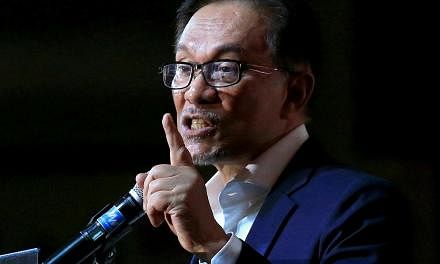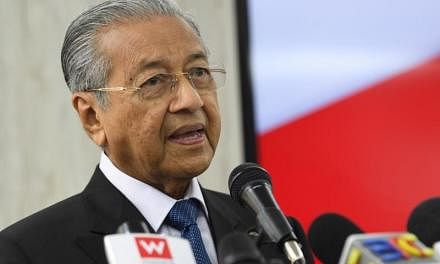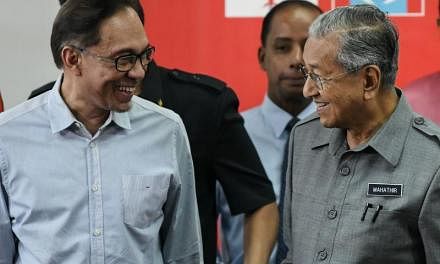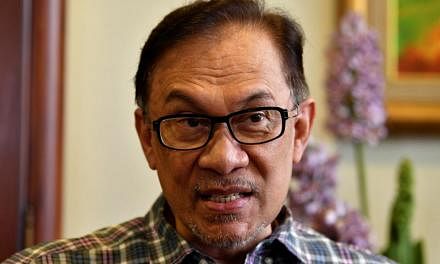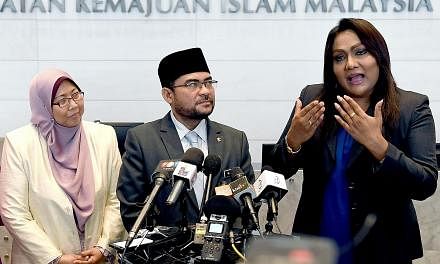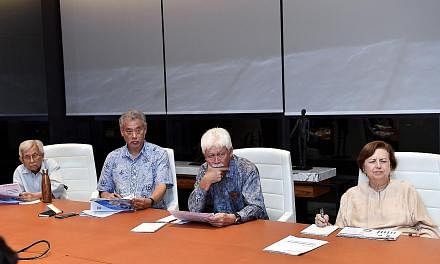KUALA LUMPUR (BLOOMBERG, BERNAMA) - Malaysian Prime Minister Mahathir Mohamad moved swiftly against predecessor Najib Razak just days after his shock election win, banning him from leaving the country and planning to reopen a probe into a multi-billion dollar scandal at a state fund that Mr Najib helped set up.
Even as a chastened Mr Najib said he would support a smooth transition of power and relinquished his dual roles as chief of his party and the broader Barisan Nasional coalition, Dr Mahathir made clear he wouldn't be lenient after a bitter and intensely personal election campaign.
Dr Mahathir, who was prime minister from 1981 to 2003 and defected to the opposition to stand as their candidate for premier, repeatedly called Mr Najib, his former protege, a "thief" before the vote and pledged to revisit the 1MDB funding issue.
His victory at the age of 92 swept away 61 years of rule by Barisan Nasional, which had maintained a grip on power since Malaysia's independence with the support of ethnic Malay voters.
Dr Mahathir on Saturday (May 12) confirmed he had personally ordered travel restrictions on Mr Najib after the former premier said he would take a short break to consider his future.
Crowds gathered at a local airport after media reports that Mr Najib and his wife were listed on a manifesto for a private plane to fly to Indonesia.
On Sunday, police began cordoning off the exit to and from the private residence of Mr Najib Razak at Jalan Langgak Duta, Taman Duta.
Sentul deputy police chief Superintendent Mohamed Rafiq Mohamed Mustafa, said policemen from the Sentul police station had been stationed there to monitor security.
"We have placed certain restrictions on a number of people who may be involved in wrongdoing or in making wrong decisions," Dr Mahathir told reporters in Kuala Lumpur.
He cited "whatever little information that justifies ourselves taking action, including detention, arrests or even preventing them from going abroad".
Dr Mahathir said he was instructing the auditor-general to remove any restrictions from the Official Secrets Act on publicising the details of a report into 1MDB, and planned to replace the attorney-general, though he did not name a candidate for the role.
The police would submit the report to him and he would study it, he said.
The US Department of Justice claims billions were siphoned from 1MDB, which was set up in 2009 to support infrastructure projects.
Mr Najib faced allegations some of 1MDB's money ended up in his personal accounts before an election in 2013.
He acknowledged around US$700 million (S$935.41 million) appeared in his accounts, but said it was a donation from the Saudi royal family and most of it was returned. He was cleared by the attorney-general of wrongdoing.
Some offshore probes are ongoing. The DOJ is seeking to seize about US$1.7 billion in what it says are misappropriated funds used to purchase a 300-foot (91.44-metre) yacht, luxury homes, artwork, and stakes in several Hollywood films, including The Wolf of Wall Street.
"We want to do it as quickly as possible," Dr Mahathir said of any resumed investigation. "It is a very complex thing because it involves a lot of people, it involves a lot of decisions made, and the money you know has to be investigated as to the money laundering. We have to contact America, Switzerland, Singapore."
Mr Najib said on Twitter he would respect the immigration department order. He called the election campaign "regrettably personal and perhaps the most intense in Malaysian history", but said he apologised "for any shortcomings and mistakes, and I thank you, the people, for the opportunity to lead our great nation".
"Is Mahathir being realistic? Let's not forget that he was prime minister for more than 20 years. He knows how to govern," said Dr Terence Lee, an associate professor of political science at the National University of Singapore, of the prospects for reopening the 1MDB probe.
"Mahathir has shown that he's interested in moving swiftly to investigate any malfeasance, including those that pertain to the former prime minister," he added. "But it will take time because it will be done through the legal system."
Dr Mahathir on Saturday named Mr Najib's former deputy Muhyiddin Yassin as Home Affairs Minister. Mr Muhyiddin was sacked by Najib in July 2015 after he called for greater clarity on the 1MDB investigations and was later expelled from Mr Najib's party, the United Malays National Organisation.
Former central bank Governor Zeti Akhtar Aziz was included on a "council of elders".
She had been uncharacteristically blunt in her criticism of 1MDB, and the central bank had urged criminal proceedings at least twice against the fund.
The government will formulate an economic policy that restores investor confidence in Malaysia after the 1MDB scandal, Mr Lim Guan Eng, who was named Finance Minister, said in a briefing on Sunday in Penang.
Still, moving against 1MDB and Mr Najib may not be straightforward.
"Malaysia attorney general's office and investigating authorities have previously announced that they found no wrongdoing on the part of senior political leaders in the previous government," said Mr Robson Lee, a Singapore-based lawyer at Gibson, Dunn & Crutcher LLP. "So this would be a threshold that have to be resolved in any review by the new government."
And while Dr Mahathir announced some Cabinet members on Saturday, cracks are already starting to show in his coalition, a disparate group of parties that Mr Najib described as a "motley collection".
Deputy Prime Minister Wan Azizah Wan Ismail, who is president of the People's Justice Party, or PKR, was notably absent from the briefing.
PKR sees the ministerial appointments as not final as they should be agreed upon by all four parties, Mr Rafizi Ramli, the party's vice president, said in a statement.
Dr Mahathir would need facto coalition leader Anwar Ibrahim's approval on behalf of PKR for the picks, Mr Rafizi said.
Dr Mahathir said before the election he would hand power to the jailed Anwar - who was his deputy premier in the late 1990s until Dr Mahathir sacked him - as soon as he is released.
While Anwar could be freed early next week, Dr Mahathir has not confirmed he will still cede the premiership to his former foe.
Separately, Mr Najib announced on Saturday he would step down as president of Umno and chairman of the broader Barisan Nasional coalition.
Former deputy premier Ahmad Zahid Hamidi will become acting Umno president, Mr Najib said at a briefing. Former defence minister Hishammuddin Hussein, who is Mr Najib's cousin, will be acting deputy president.
"Maybe this will give us a chance to improve on whatever weaknesses and flaws we must tackle," Mr Najib said.
After his comments he was surrounded and hugged by crying party members.

